Organisational Behaviour Analysis of BBC: Culture, Motivation, Teams
VerifiedAdded on 2020/07/22
|17
|5065
|39
Report
AI Summary
This report provides an in-depth analysis of the organisational behaviour within the British Broadcasting Corporation (BBC). It begins by examining Handy's cultural typology and its relevance to the BBC, exploring how culture, power, and politics influence individual and team behaviour. The report delves into motivational theories, including Maslow's hierarchy of needs and Herzberg's two-factor theory, evaluating their impact on team effectiveness and suggesting ways to improve motivation within the BBC. Furthermore, it explores different types of teams within the BBC, applying Tuckman's model for team development. The report concludes with an evaluation of organisational theory and its concepts, identifying barriers affecting the BBC's performance and offering insights into organisational behaviour principles.
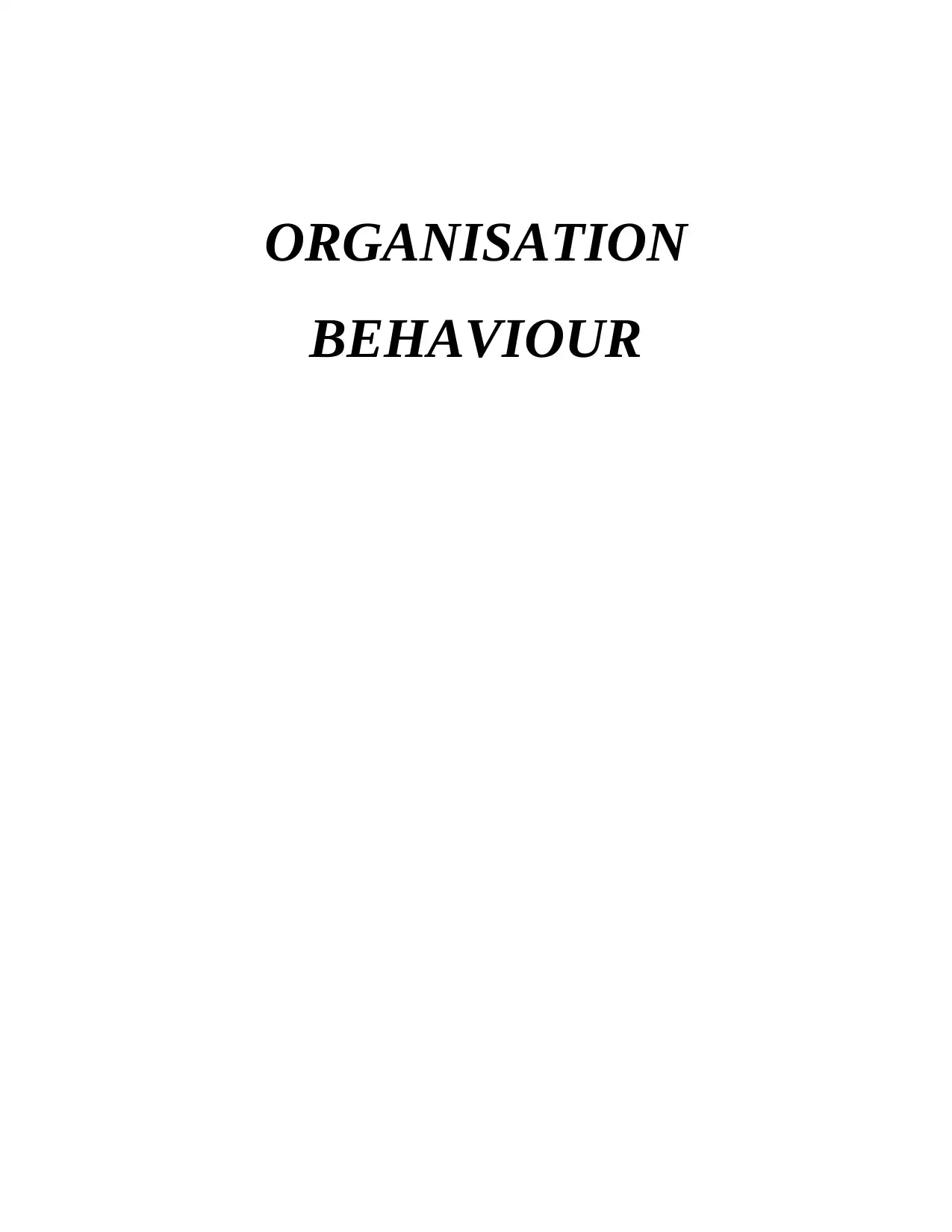
ORGANISATION
BEHAVIOUR
BEHAVIOUR
Paraphrase This Document
Need a fresh take? Get an instant paraphrase of this document with our AI Paraphraser
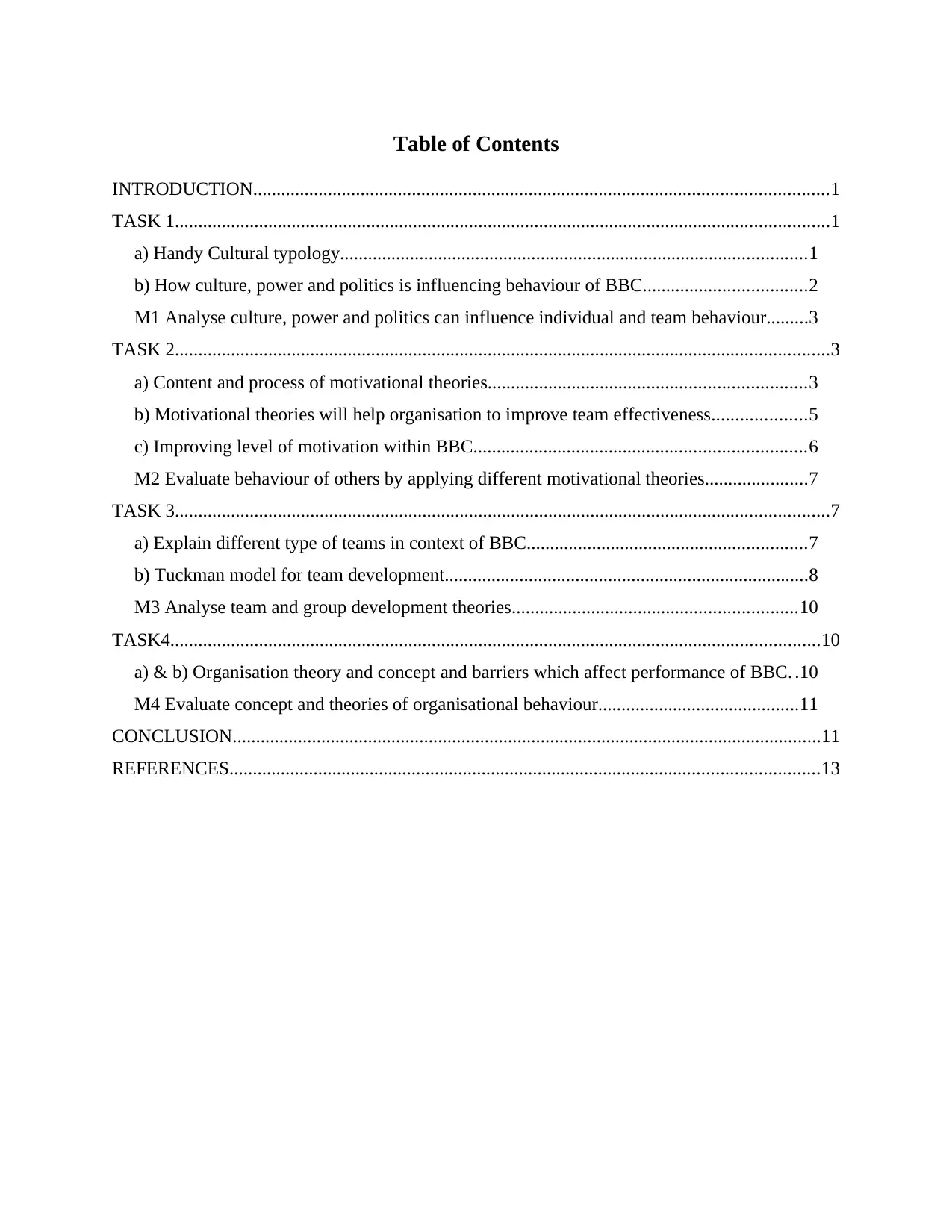
Table of Contents
INTRODUCTION...........................................................................................................................1
TASK 1............................................................................................................................................1
a) Handy Cultural typology....................................................................................................1
b) How culture, power and politics is influencing behaviour of BBC...................................2
M1 Analyse culture, power and politics can influence individual and team behaviour.........3
TASK 2............................................................................................................................................3
a) Content and process of motivational theories....................................................................3
b) Motivational theories will help organisation to improve team effectiveness....................5
c) Improving level of motivation within BBC.......................................................................6
M2 Evaluate behaviour of others by applying different motivational theories......................7
TASK 3............................................................................................................................................7
a) Explain different type of teams in context of BBC............................................................7
b) Tuckman model for team development..............................................................................8
M3 Analyse team and group development theories.............................................................10
TASK4...........................................................................................................................................10
a) & b) Organisation theory and concept and barriers which affect performance of BBC. .10
M4 Evaluate concept and theories of organisational behaviour...........................................11
CONCLUSION..............................................................................................................................11
REFERENCES..............................................................................................................................13
INTRODUCTION...........................................................................................................................1
TASK 1............................................................................................................................................1
a) Handy Cultural typology....................................................................................................1
b) How culture, power and politics is influencing behaviour of BBC...................................2
M1 Analyse culture, power and politics can influence individual and team behaviour.........3
TASK 2............................................................................................................................................3
a) Content and process of motivational theories....................................................................3
b) Motivational theories will help organisation to improve team effectiveness....................5
c) Improving level of motivation within BBC.......................................................................6
M2 Evaluate behaviour of others by applying different motivational theories......................7
TASK 3............................................................................................................................................7
a) Explain different type of teams in context of BBC............................................................7
b) Tuckman model for team development..............................................................................8
M3 Analyse team and group development theories.............................................................10
TASK4...........................................................................................................................................10
a) & b) Organisation theory and concept and barriers which affect performance of BBC. .10
M4 Evaluate concept and theories of organisational behaviour...........................................11
CONCLUSION..............................................................................................................................11
REFERENCES..............................................................................................................................13

⊘ This is a preview!⊘
Do you want full access?
Subscribe today to unlock all pages.

Trusted by 1+ million students worldwide
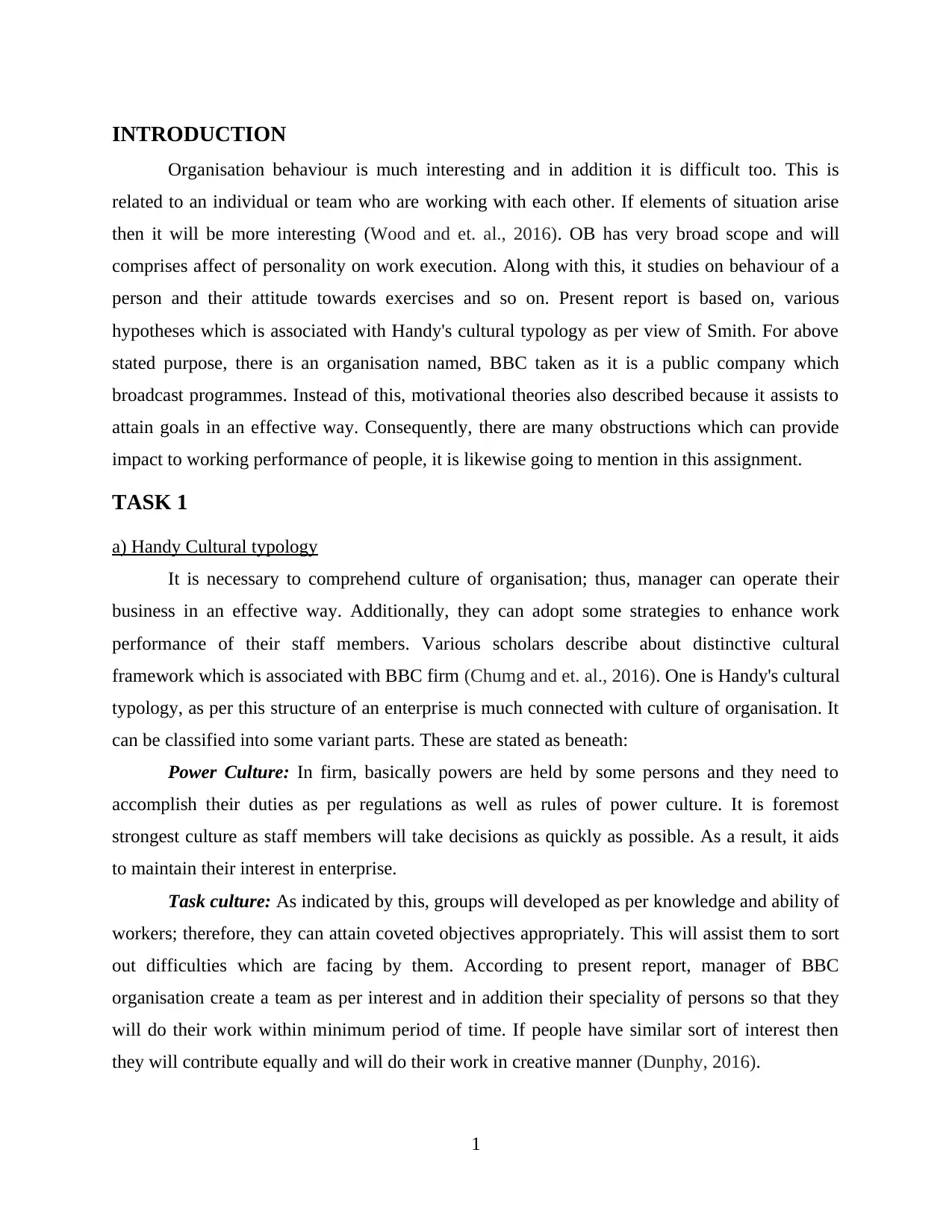
INTRODUCTION
Organisation behaviour is much interesting and in addition it is difficult too. This is
related to an individual or team who are working with each other. If elements of situation arise
then it will be more interesting (Wood and et. al., 2016). OB has very broad scope and will
comprises affect of personality on work execution. Along with this, it studies on behaviour of a
person and their attitude towards exercises and so on. Present report is based on, various
hypotheses which is associated with Handy's cultural typology as per view of Smith. For above
stated purpose, there is an organisation named, BBC taken as it is a public company which
broadcast programmes. Instead of this, motivational theories also described because it assists to
attain goals in an effective way. Consequently, there are many obstructions which can provide
impact to working performance of people, it is likewise going to mention in this assignment.
TASK 1
a) Handy Cultural typology
It is necessary to comprehend culture of organisation; thus, manager can operate their
business in an effective way. Additionally, they can adopt some strategies to enhance work
performance of their staff members. Various scholars describe about distinctive cultural
framework which is associated with BBC firm (Chumg and et. al., 2016). One is Handy's cultural
typology, as per this structure of an enterprise is much connected with culture of organisation. It
can be classified into some variant parts. These are stated as beneath:
Power Culture: In firm, basically powers are held by some persons and they need to
accomplish their duties as per regulations as well as rules of power culture. It is foremost
strongest culture as staff members will take decisions as quickly as possible. As a result, it aids
to maintain their interest in enterprise.
Task culture: As indicated by this, groups will developed as per knowledge and ability of
workers; therefore, they can attain coveted objectives appropriately. This will assist them to sort
out difficulties which are facing by them. According to present report, manager of BBC
organisation create a team as per interest and in addition their speciality of persons so that they
will do their work within minimum period of time. If people have similar sort of interest then
they will contribute equally and will do their work in creative manner (Dunphy, 2016).
1
Organisation behaviour is much interesting and in addition it is difficult too. This is
related to an individual or team who are working with each other. If elements of situation arise
then it will be more interesting (Wood and et. al., 2016). OB has very broad scope and will
comprises affect of personality on work execution. Along with this, it studies on behaviour of a
person and their attitude towards exercises and so on. Present report is based on, various
hypotheses which is associated with Handy's cultural typology as per view of Smith. For above
stated purpose, there is an organisation named, BBC taken as it is a public company which
broadcast programmes. Instead of this, motivational theories also described because it assists to
attain goals in an effective way. Consequently, there are many obstructions which can provide
impact to working performance of people, it is likewise going to mention in this assignment.
TASK 1
a) Handy Cultural typology
It is necessary to comprehend culture of organisation; thus, manager can operate their
business in an effective way. Additionally, they can adopt some strategies to enhance work
performance of their staff members. Various scholars describe about distinctive cultural
framework which is associated with BBC firm (Chumg and et. al., 2016). One is Handy's cultural
typology, as per this structure of an enterprise is much connected with culture of organisation. It
can be classified into some variant parts. These are stated as beneath:
Power Culture: In firm, basically powers are held by some persons and they need to
accomplish their duties as per regulations as well as rules of power culture. It is foremost
strongest culture as staff members will take decisions as quickly as possible. As a result, it aids
to maintain their interest in enterprise.
Task culture: As indicated by this, groups will developed as per knowledge and ability of
workers; therefore, they can attain coveted objectives appropriately. This will assist them to sort
out difficulties which are facing by them. According to present report, manager of BBC
organisation create a team as per interest and in addition their speciality of persons so that they
will do their work within minimum period of time. If people have similar sort of interest then
they will contribute equally and will do their work in creative manner (Dunphy, 2016).
1
Paraphrase This Document
Need a fresh take? Get an instant paraphrase of this document with our AI Paraphraser
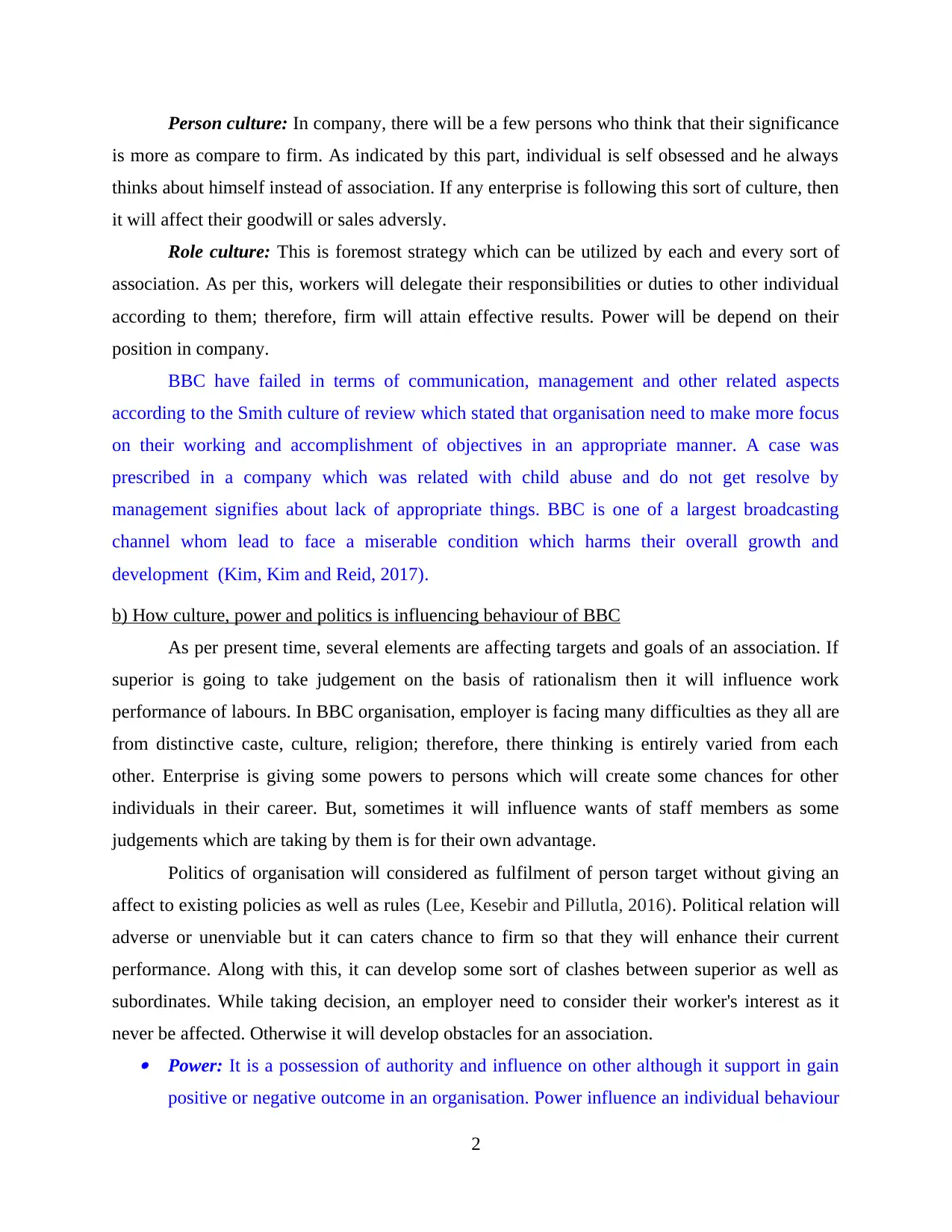
Person culture: In company, there will be a few persons who think that their significance
is more as compare to firm. As indicated by this part, individual is self obsessed and he always
thinks about himself instead of association. If any enterprise is following this sort of culture, then
it will affect their goodwill or sales adversly.
Role culture: This is foremost strategy which can be utilized by each and every sort of
association. As per this, workers will delegate their responsibilities or duties to other individual
according to them; therefore, firm will attain effective results. Power will be depend on their
position in company.
BBC have failed in terms of communication, management and other related aspects
according to the Smith culture of review which stated that organisation need to make more focus
on their working and accomplishment of objectives in an appropriate manner. A case was
prescribed in a company which was related with child abuse and do not get resolve by
management signifies about lack of appropriate things. BBC is one of a largest broadcasting
channel whom lead to face a miserable condition which harms their overall growth and
development (Kim, Kim and Reid, 2017).
b) How culture, power and politics is influencing behaviour of BBC
As per present time, several elements are affecting targets and goals of an association. If
superior is going to take judgement on the basis of rationalism then it will influence work
performance of labours. In BBC organisation, employer is facing many difficulties as they all are
from distinctive caste, culture, religion; therefore, there thinking is entirely varied from each
other. Enterprise is giving some powers to persons which will create some chances for other
individuals in their career. But, sometimes it will influence wants of staff members as some
judgements which are taking by them is for their own advantage.
Politics of organisation will considered as fulfilment of person target without giving an
affect to existing policies as well as rules (Lee, Kesebir and Pillutla, 2016). Political relation will
adverse or unenviable but it can caters chance to firm so that they will enhance their current
performance. Along with this, it can develop some sort of clashes between superior as well as
subordinates. While taking decision, an employer need to consider their worker's interest as it
never be affected. Otherwise it will develop obstacles for an association. Power: It is a possession of authority and influence on other although it support in gain
positive or negative outcome in an organisation. Power influence an individual behaviour
2
is more as compare to firm. As indicated by this part, individual is self obsessed and he always
thinks about himself instead of association. If any enterprise is following this sort of culture, then
it will affect their goodwill or sales adversly.
Role culture: This is foremost strategy which can be utilized by each and every sort of
association. As per this, workers will delegate their responsibilities or duties to other individual
according to them; therefore, firm will attain effective results. Power will be depend on their
position in company.
BBC have failed in terms of communication, management and other related aspects
according to the Smith culture of review which stated that organisation need to make more focus
on their working and accomplishment of objectives in an appropriate manner. A case was
prescribed in a company which was related with child abuse and do not get resolve by
management signifies about lack of appropriate things. BBC is one of a largest broadcasting
channel whom lead to face a miserable condition which harms their overall growth and
development (Kim, Kim and Reid, 2017).
b) How culture, power and politics is influencing behaviour of BBC
As per present time, several elements are affecting targets and goals of an association. If
superior is going to take judgement on the basis of rationalism then it will influence work
performance of labours. In BBC organisation, employer is facing many difficulties as they all are
from distinctive caste, culture, religion; therefore, there thinking is entirely varied from each
other. Enterprise is giving some powers to persons which will create some chances for other
individuals in their career. But, sometimes it will influence wants of staff members as some
judgements which are taking by them is for their own advantage.
Politics of organisation will considered as fulfilment of person target without giving an
affect to existing policies as well as rules (Lee, Kesebir and Pillutla, 2016). Political relation will
adverse or unenviable but it can caters chance to firm so that they will enhance their current
performance. Along with this, it can develop some sort of clashes between superior as well as
subordinates. While taking decision, an employer need to consider their worker's interest as it
never be affected. Otherwise it will develop obstacles for an association. Power: It is a possession of authority and influence on other although it support in gain
positive or negative outcome in an organisation. Power influence an individual behaviour
2
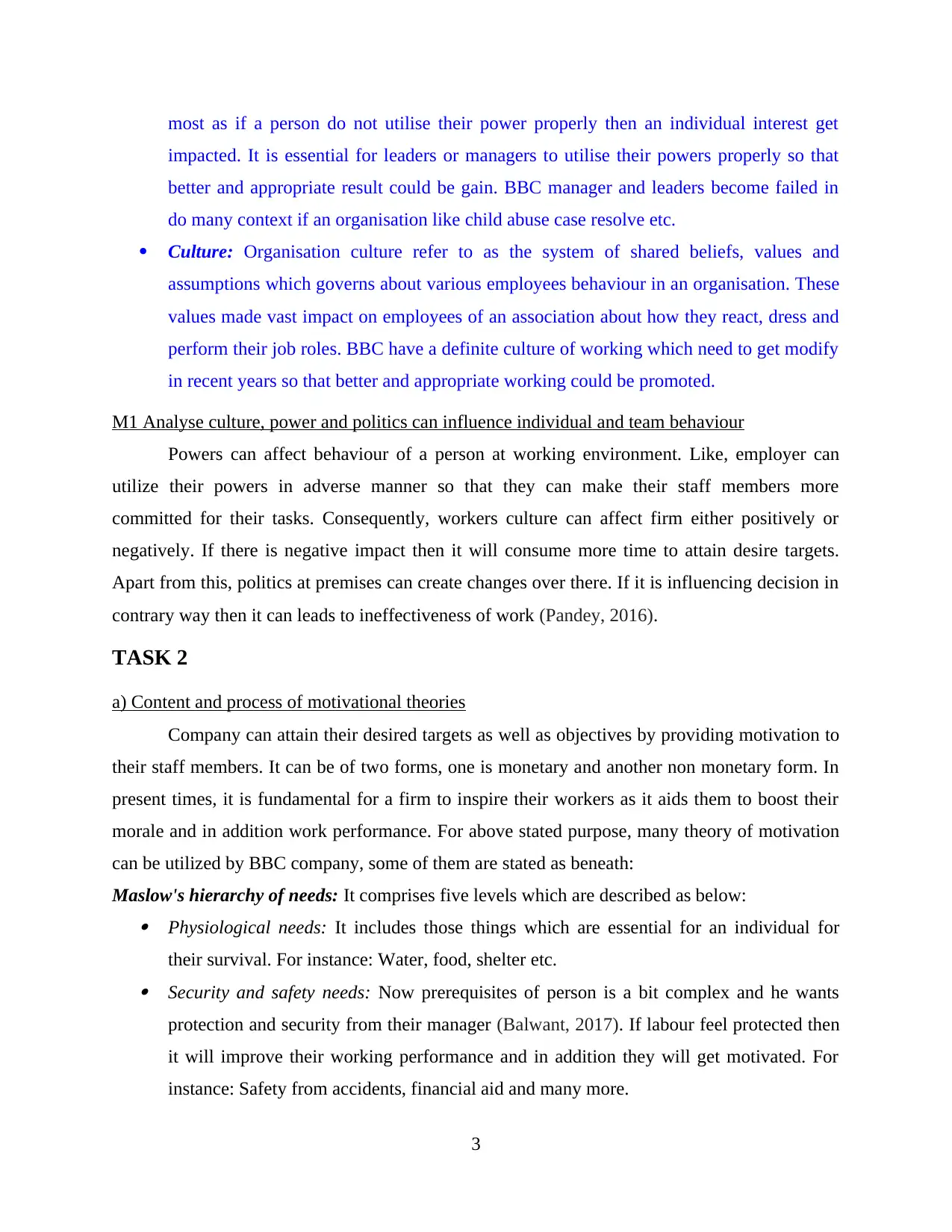
most as if a person do not utilise their power properly then an individual interest get
impacted. It is essential for leaders or managers to utilise their powers properly so that
better and appropriate result could be gain. BBC manager and leaders become failed in
do many context if an organisation like child abuse case resolve etc.
Culture: Organisation culture refer to as the system of shared beliefs, values and
assumptions which governs about various employees behaviour in an organisation. These
values made vast impact on employees of an association about how they react, dress and
perform their job roles. BBC have a definite culture of working which need to get modify
in recent years so that better and appropriate working could be promoted.
M1 Analyse culture, power and politics can influence individual and team behaviour
Powers can affect behaviour of a person at working environment. Like, employer can
utilize their powers in adverse manner so that they can make their staff members more
committed for their tasks. Consequently, workers culture can affect firm either positively or
negatively. If there is negative impact then it will consume more time to attain desire targets.
Apart from this, politics at premises can create changes over there. If it is influencing decision in
contrary way then it can leads to ineffectiveness of work (Pandey, 2016).
TASK 2
a) Content and process of motivational theories
Company can attain their desired targets as well as objectives by providing motivation to
their staff members. It can be of two forms, one is monetary and another non monetary form. In
present times, it is fundamental for a firm to inspire their workers as it aids them to boost their
morale and in addition work performance. For above stated purpose, many theory of motivation
can be utilized by BBC company, some of them are stated as beneath:
Maslow's hierarchy of needs: It comprises five levels which are described as below: Physiological needs: It includes those things which are essential for an individual for
their survival. For instance: Water, food, shelter etc. Security and safety needs: Now prerequisites of person is a bit complex and he wants
protection and security from their manager (Balwant, 2017). If labour feel protected then
it will improve their working performance and in addition they will get motivated. For
instance: Safety from accidents, financial aid and many more.
3
impacted. It is essential for leaders or managers to utilise their powers properly so that
better and appropriate result could be gain. BBC manager and leaders become failed in
do many context if an organisation like child abuse case resolve etc.
Culture: Organisation culture refer to as the system of shared beliefs, values and
assumptions which governs about various employees behaviour in an organisation. These
values made vast impact on employees of an association about how they react, dress and
perform their job roles. BBC have a definite culture of working which need to get modify
in recent years so that better and appropriate working could be promoted.
M1 Analyse culture, power and politics can influence individual and team behaviour
Powers can affect behaviour of a person at working environment. Like, employer can
utilize their powers in adverse manner so that they can make their staff members more
committed for their tasks. Consequently, workers culture can affect firm either positively or
negatively. If there is negative impact then it will consume more time to attain desire targets.
Apart from this, politics at premises can create changes over there. If it is influencing decision in
contrary way then it can leads to ineffectiveness of work (Pandey, 2016).
TASK 2
a) Content and process of motivational theories
Company can attain their desired targets as well as objectives by providing motivation to
their staff members. It can be of two forms, one is monetary and another non monetary form. In
present times, it is fundamental for a firm to inspire their workers as it aids them to boost their
morale and in addition work performance. For above stated purpose, many theory of motivation
can be utilized by BBC company, some of them are stated as beneath:
Maslow's hierarchy of needs: It comprises five levels which are described as below: Physiological needs: It includes those things which are essential for an individual for
their survival. For instance: Water, food, shelter etc. Security and safety needs: Now prerequisites of person is a bit complex and he wants
protection and security from their manager (Balwant, 2017). If labour feel protected then
it will improve their working performance and in addition they will get motivated. For
instance: Safety from accidents, financial aid and many more.
3
⊘ This is a preview!⊘
Do you want full access?
Subscribe today to unlock all pages.

Trusted by 1+ million students worldwide
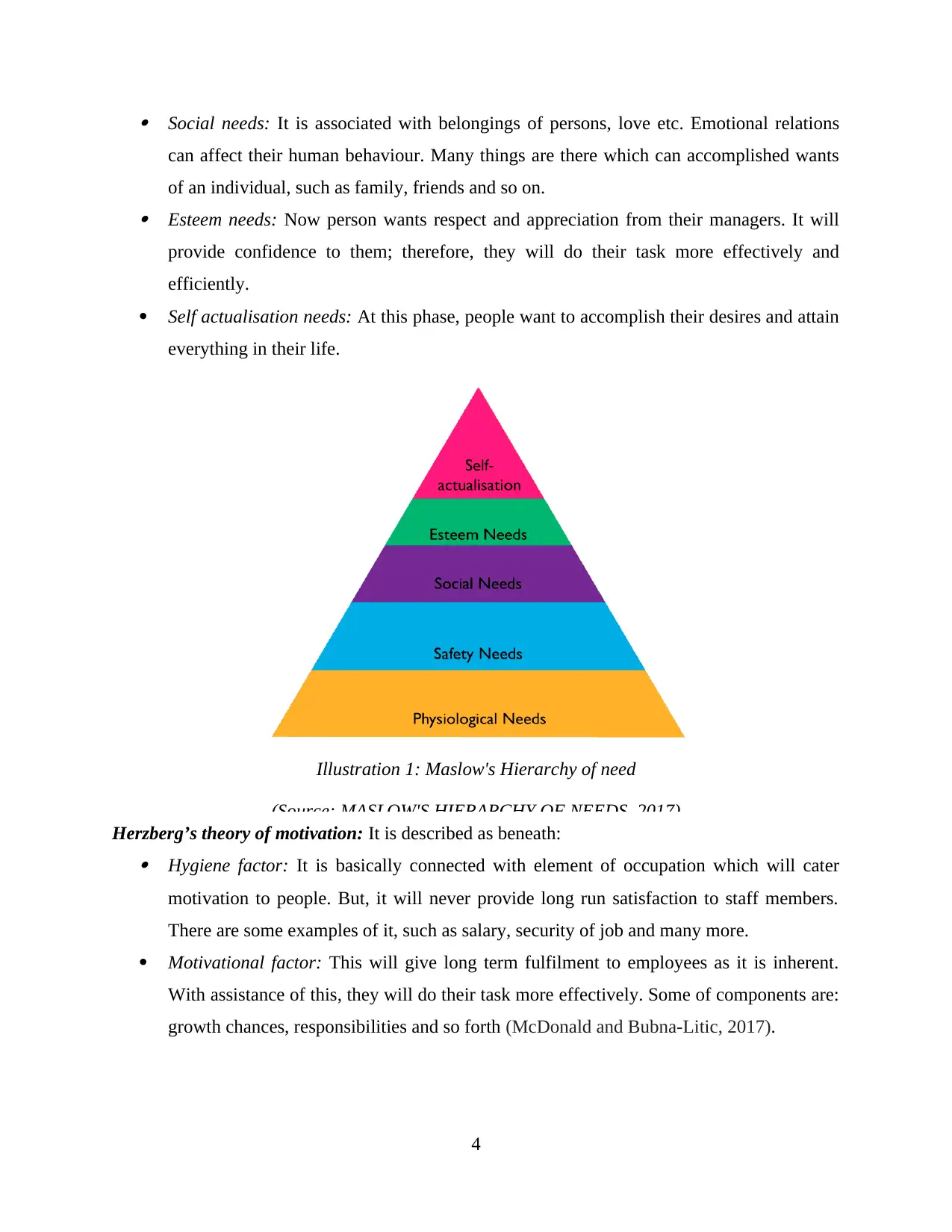
Social needs: It is associated with belongings of persons, love etc. Emotional relations
can affect their human behaviour. Many things are there which can accomplished wants
of an individual, such as family, friends and so on. Esteem needs: Now person wants respect and appreciation from their managers. It will
provide confidence to them; therefore, they will do their task more effectively and
efficiently.
Self actualisation needs: At this phase, people want to accomplish their desires and attain
everything in their life.
Herzberg’s theory of motivation: It is described as beneath: Hygiene factor: It is basically connected with element of occupation which will cater
motivation to people. But, it will never provide long run satisfaction to staff members.
There are some examples of it, such as salary, security of job and many more.
Motivational factor: This will give long term fulfilment to employees as it is inherent.
With assistance of this, they will do their task more effectively. Some of components are:
growth chances, responsibilities and so forth (McDonald and Bubna-Litic, 2017).
4
Illustration 1: Maslow's Hierarchy of need
(Source: MASLOW'S HIERARCHY OF NEEDS, 2017)
can affect their human behaviour. Many things are there which can accomplished wants
of an individual, such as family, friends and so on. Esteem needs: Now person wants respect and appreciation from their managers. It will
provide confidence to them; therefore, they will do their task more effectively and
efficiently.
Self actualisation needs: At this phase, people want to accomplish their desires and attain
everything in their life.
Herzberg’s theory of motivation: It is described as beneath: Hygiene factor: It is basically connected with element of occupation which will cater
motivation to people. But, it will never provide long run satisfaction to staff members.
There are some examples of it, such as salary, security of job and many more.
Motivational factor: This will give long term fulfilment to employees as it is inherent.
With assistance of this, they will do their task more effectively. Some of components are:
growth chances, responsibilities and so forth (McDonald and Bubna-Litic, 2017).
4
Illustration 1: Maslow's Hierarchy of need
(Source: MASLOW'S HIERARCHY OF NEEDS, 2017)
Paraphrase This Document
Need a fresh take? Get an instant paraphrase of this document with our AI Paraphraser
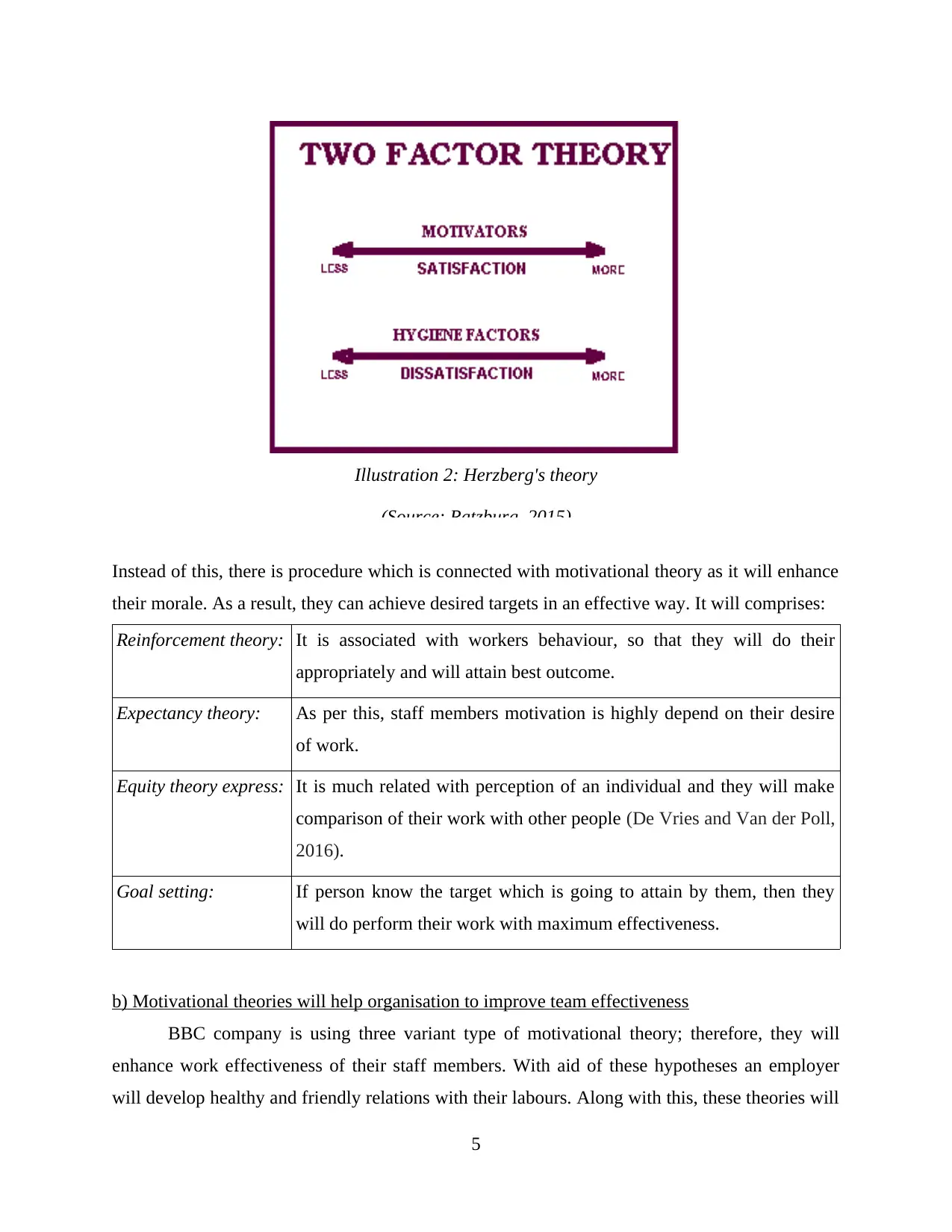
Instead of this, there is procedure which is connected with motivational theory as it will enhance
their morale. As a result, they can achieve desired targets in an effective way. It will comprises:
Reinforcement theory: It is associated with workers behaviour, so that they will do their
appropriately and will attain best outcome.
Expectancy theory: As per this, staff members motivation is highly depend on their desire
of work.
Equity theory express: It is much related with perception of an individual and they will make
comparison of their work with other people (De Vries and Van der Poll,
2016).
Goal setting: If person know the target which is going to attain by them, then they
will do perform their work with maximum effectiveness.
b) Motivational theories will help organisation to improve team effectiveness
BBC company is using three variant type of motivational theory; therefore, they will
enhance work effectiveness of their staff members. With aid of these hypotheses an employer
will develop healthy and friendly relations with their labours. Along with this, these theories will
5
Illustration 2: Herzberg's theory
(Source: Ratzburg, 2015)
their morale. As a result, they can achieve desired targets in an effective way. It will comprises:
Reinforcement theory: It is associated with workers behaviour, so that they will do their
appropriately and will attain best outcome.
Expectancy theory: As per this, staff members motivation is highly depend on their desire
of work.
Equity theory express: It is much related with perception of an individual and they will make
comparison of their work with other people (De Vries and Van der Poll,
2016).
Goal setting: If person know the target which is going to attain by them, then they
will do perform their work with maximum effectiveness.
b) Motivational theories will help organisation to improve team effectiveness
BBC company is using three variant type of motivational theory; therefore, they will
enhance work effectiveness of their staff members. With aid of these hypotheses an employer
will develop healthy and friendly relations with their labours. Along with this, these theories will
5
Illustration 2: Herzberg's theory
(Source: Ratzburg, 2015)
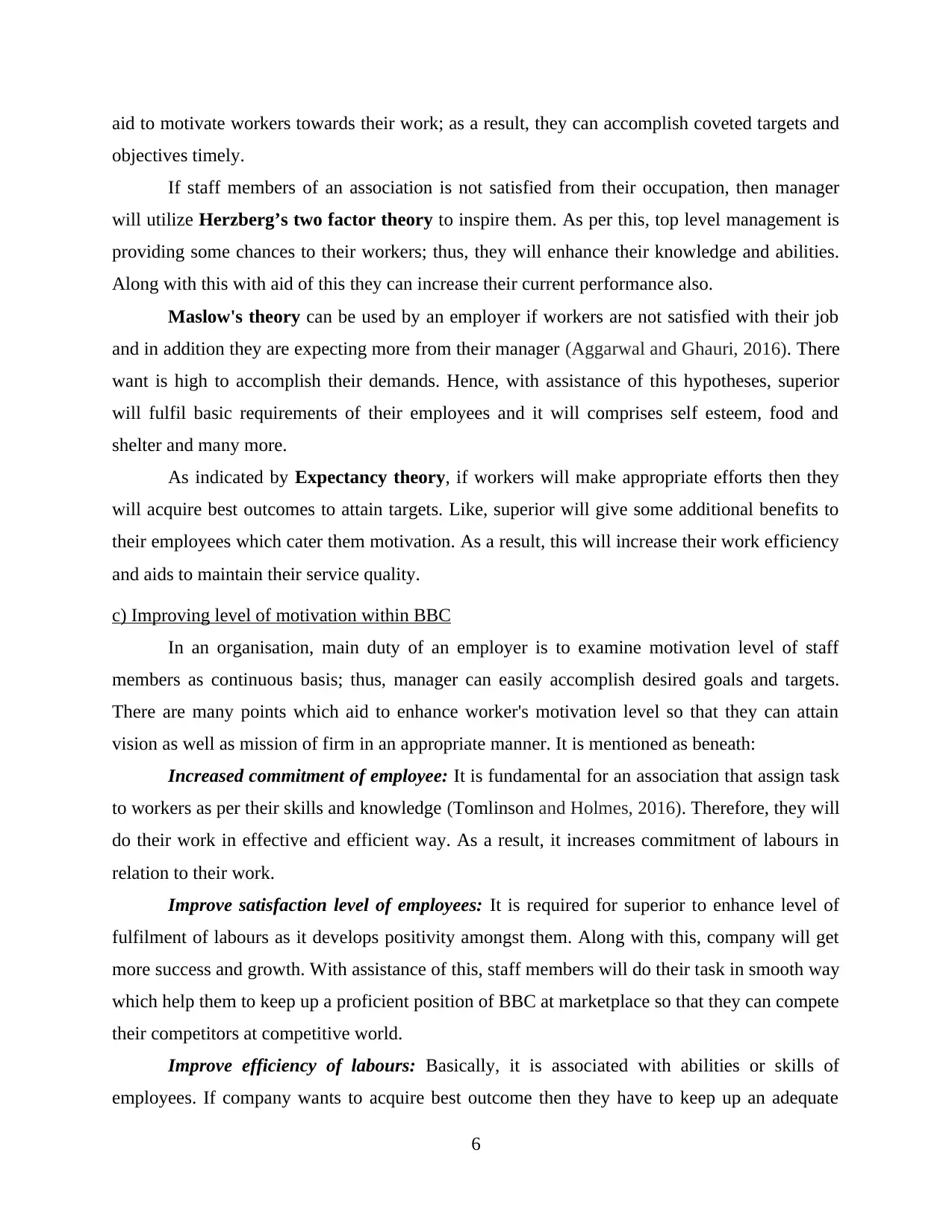
aid to motivate workers towards their work; as a result, they can accomplish coveted targets and
objectives timely.
If staff members of an association is not satisfied from their occupation, then manager
will utilize Herzberg’s two factor theory to inspire them. As per this, top level management is
providing some chances to their workers; thus, they will enhance their knowledge and abilities.
Along with this with aid of this they can increase their current performance also.
Maslow's theory can be used by an employer if workers are not satisfied with their job
and in addition they are expecting more from their manager (Aggarwal and Ghauri, 2016). There
want is high to accomplish their demands. Hence, with assistance of this hypotheses, superior
will fulfil basic requirements of their employees and it will comprises self esteem, food and
shelter and many more.
As indicated by Expectancy theory, if workers will make appropriate efforts then they
will acquire best outcomes to attain targets. Like, superior will give some additional benefits to
their employees which cater them motivation. As a result, this will increase their work efficiency
and aids to maintain their service quality.
c) Improving level of motivation within BBC
In an organisation, main duty of an employer is to examine motivation level of staff
members as continuous basis; thus, manager can easily accomplish desired goals and targets.
There are many points which aid to enhance worker's motivation level so that they can attain
vision as well as mission of firm in an appropriate manner. It is mentioned as beneath:
Increased commitment of employee: It is fundamental for an association that assign task
to workers as per their skills and knowledge (Tomlinson and Holmes, 2016). Therefore, they will
do their work in effective and efficient way. As a result, it increases commitment of labours in
relation to their work.
Improve satisfaction level of employees: It is required for superior to enhance level of
fulfilment of labours as it develops positivity amongst them. Along with this, company will get
more success and growth. With assistance of this, staff members will do their task in smooth way
which help them to keep up a proficient position of BBC at marketplace so that they can compete
their competitors at competitive world.
Improve efficiency of labours: Basically, it is associated with abilities or skills of
employees. If company wants to acquire best outcome then they have to keep up an adequate
6
objectives timely.
If staff members of an association is not satisfied from their occupation, then manager
will utilize Herzberg’s two factor theory to inspire them. As per this, top level management is
providing some chances to their workers; thus, they will enhance their knowledge and abilities.
Along with this with aid of this they can increase their current performance also.
Maslow's theory can be used by an employer if workers are not satisfied with their job
and in addition they are expecting more from their manager (Aggarwal and Ghauri, 2016). There
want is high to accomplish their demands. Hence, with assistance of this hypotheses, superior
will fulfil basic requirements of their employees and it will comprises self esteem, food and
shelter and many more.
As indicated by Expectancy theory, if workers will make appropriate efforts then they
will acquire best outcomes to attain targets. Like, superior will give some additional benefits to
their employees which cater them motivation. As a result, this will increase their work efficiency
and aids to maintain their service quality.
c) Improving level of motivation within BBC
In an organisation, main duty of an employer is to examine motivation level of staff
members as continuous basis; thus, manager can easily accomplish desired goals and targets.
There are many points which aid to enhance worker's motivation level so that they can attain
vision as well as mission of firm in an appropriate manner. It is mentioned as beneath:
Increased commitment of employee: It is fundamental for an association that assign task
to workers as per their skills and knowledge (Tomlinson and Holmes, 2016). Therefore, they will
do their work in effective and efficient way. As a result, it increases commitment of labours in
relation to their work.
Improve satisfaction level of employees: It is required for superior to enhance level of
fulfilment of labours as it develops positivity amongst them. Along with this, company will get
more success and growth. With assistance of this, staff members will do their task in smooth way
which help them to keep up a proficient position of BBC at marketplace so that they can compete
their competitors at competitive world.
Improve efficiency of labours: Basically, it is associated with abilities or skills of
employees. If company wants to acquire best outcome then they have to keep up an adequate
6
⊘ This is a preview!⊘
Do you want full access?
Subscribe today to unlock all pages.

Trusted by 1+ million students worldwide
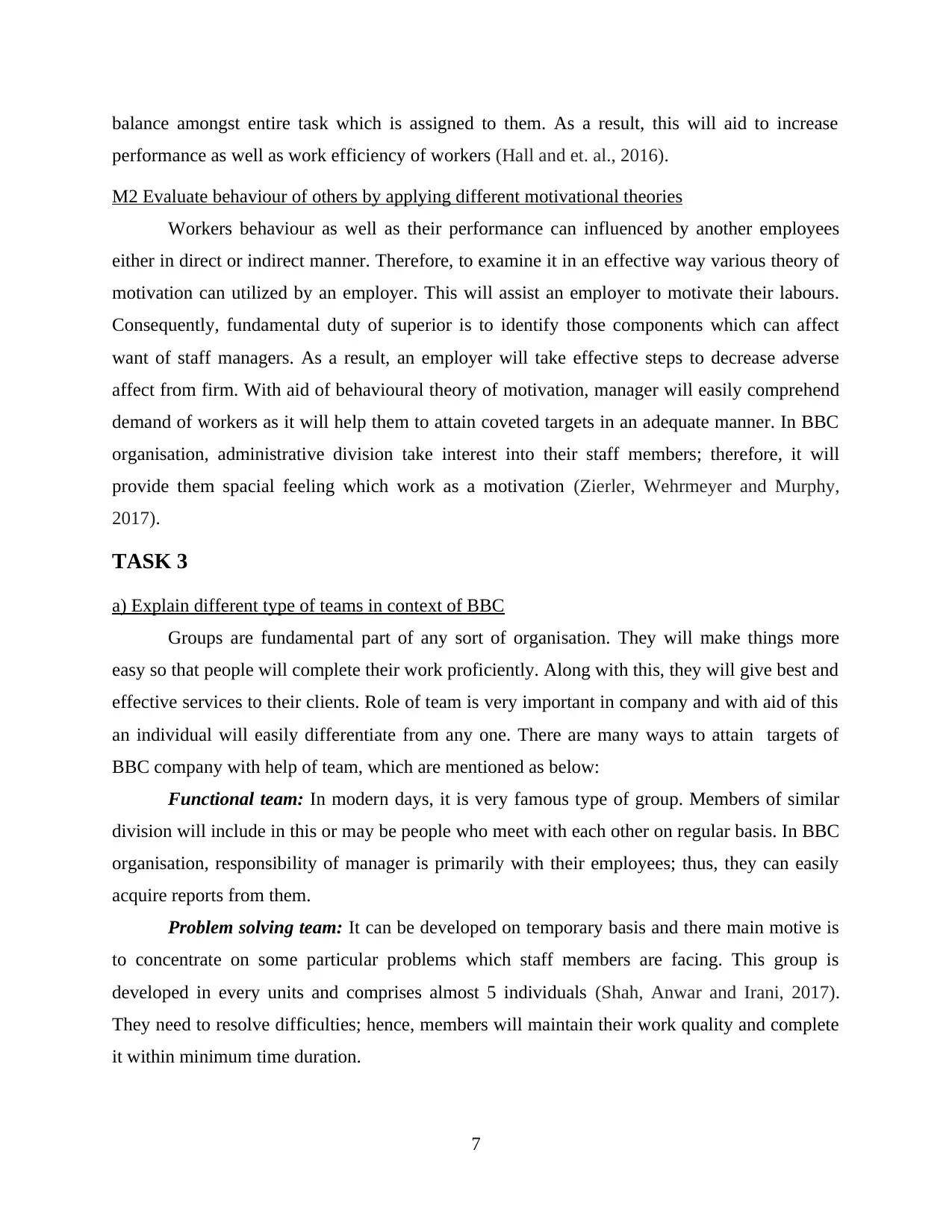
balance amongst entire task which is assigned to them. As a result, this will aid to increase
performance as well as work efficiency of workers (Hall and et. al., 2016).
M2 Evaluate behaviour of others by applying different motivational theories
Workers behaviour as well as their performance can influenced by another employees
either in direct or indirect manner. Therefore, to examine it in an effective way various theory of
motivation can utilized by an employer. This will assist an employer to motivate their labours.
Consequently, fundamental duty of superior is to identify those components which can affect
want of staff managers. As a result, an employer will take effective steps to decrease adverse
affect from firm. With aid of behavioural theory of motivation, manager will easily comprehend
demand of workers as it will help them to attain coveted targets in an adequate manner. In BBC
organisation, administrative division take interest into their staff members; therefore, it will
provide them spacial feeling which work as a motivation (Zierler, Wehrmeyer and Murphy,
2017).
TASK 3
a) Explain different type of teams in context of BBC
Groups are fundamental part of any sort of organisation. They will make things more
easy so that people will complete their work proficiently. Along with this, they will give best and
effective services to their clients. Role of team is very important in company and with aid of this
an individual will easily differentiate from any one. There are many ways to attain targets of
BBC company with help of team, which are mentioned as below:
Functional team: In modern days, it is very famous type of group. Members of similar
division will include in this or may be people who meet with each other on regular basis. In BBC
organisation, responsibility of manager is primarily with their employees; thus, they can easily
acquire reports from them.
Problem solving team: It can be developed on temporary basis and there main motive is
to concentrate on some particular problems which staff members are facing. This group is
developed in every units and comprises almost 5 individuals (Shah, Anwar and Irani, 2017).
They need to resolve difficulties; hence, members will maintain their work quality and complete
it within minimum time duration.
7
performance as well as work efficiency of workers (Hall and et. al., 2016).
M2 Evaluate behaviour of others by applying different motivational theories
Workers behaviour as well as their performance can influenced by another employees
either in direct or indirect manner. Therefore, to examine it in an effective way various theory of
motivation can utilized by an employer. This will assist an employer to motivate their labours.
Consequently, fundamental duty of superior is to identify those components which can affect
want of staff managers. As a result, an employer will take effective steps to decrease adverse
affect from firm. With aid of behavioural theory of motivation, manager will easily comprehend
demand of workers as it will help them to attain coveted targets in an adequate manner. In BBC
organisation, administrative division take interest into their staff members; therefore, it will
provide them spacial feeling which work as a motivation (Zierler, Wehrmeyer and Murphy,
2017).
TASK 3
a) Explain different type of teams in context of BBC
Groups are fundamental part of any sort of organisation. They will make things more
easy so that people will complete their work proficiently. Along with this, they will give best and
effective services to their clients. Role of team is very important in company and with aid of this
an individual will easily differentiate from any one. There are many ways to attain targets of
BBC company with help of team, which are mentioned as below:
Functional team: In modern days, it is very famous type of group. Members of similar
division will include in this or may be people who meet with each other on regular basis. In BBC
organisation, responsibility of manager is primarily with their employees; thus, they can easily
acquire reports from them.
Problem solving team: It can be developed on temporary basis and there main motive is
to concentrate on some particular problems which staff members are facing. This group is
developed in every units and comprises almost 5 individuals (Shah, Anwar and Irani, 2017).
They need to resolve difficulties; hence, members will maintain their work quality and complete
it within minimum time duration.
7
Paraphrase This Document
Need a fresh take? Get an instant paraphrase of this document with our AI Paraphraser
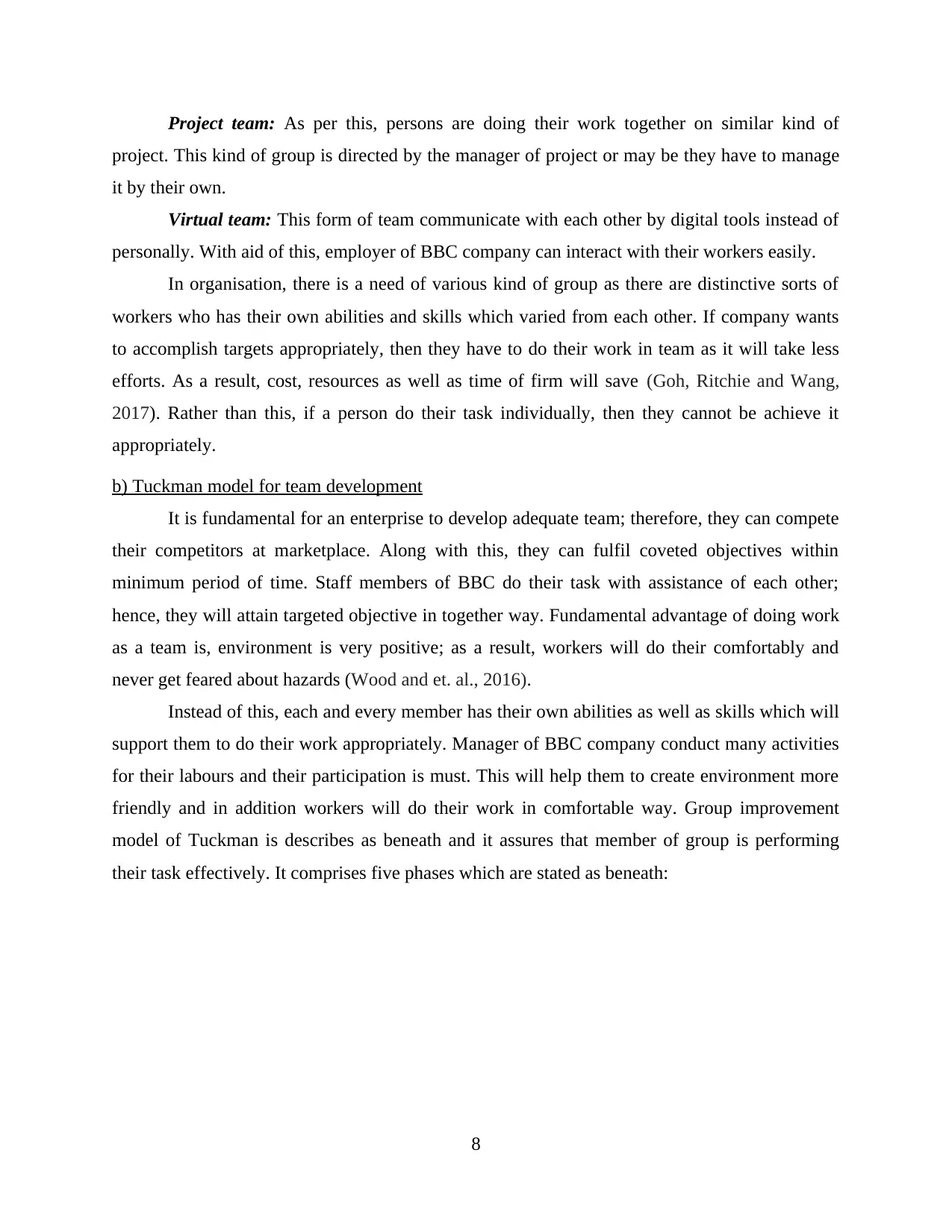
Project team: As per this, persons are doing their work together on similar kind of
project. This kind of group is directed by the manager of project or may be they have to manage
it by their own.
Virtual team: This form of team communicate with each other by digital tools instead of
personally. With aid of this, employer of BBC company can interact with their workers easily.
In organisation, there is a need of various kind of group as there are distinctive sorts of
workers who has their own abilities and skills which varied from each other. If company wants
to accomplish targets appropriately, then they have to do their work in team as it will take less
efforts. As a result, cost, resources as well as time of firm will save (Goh, Ritchie and Wang,
2017). Rather than this, if a person do their task individually, then they cannot be achieve it
appropriately.
b) Tuckman model for team development
It is fundamental for an enterprise to develop adequate team; therefore, they can compete
their competitors at marketplace. Along with this, they can fulfil coveted objectives within
minimum period of time. Staff members of BBC do their task with assistance of each other;
hence, they will attain targeted objective in together way. Fundamental advantage of doing work
as a team is, environment is very positive; as a result, workers will do their comfortably and
never get feared about hazards (Wood and et. al., 2016).
Instead of this, each and every member has their own abilities as well as skills which will
support them to do their work appropriately. Manager of BBC company conduct many activities
for their labours and their participation is must. This will help them to create environment more
friendly and in addition workers will do their work in comfortable way. Group improvement
model of Tuckman is describes as beneath and it assures that member of group is performing
their task effectively. It comprises five phases which are stated as beneath:
8
project. This kind of group is directed by the manager of project or may be they have to manage
it by their own.
Virtual team: This form of team communicate with each other by digital tools instead of
personally. With aid of this, employer of BBC company can interact with their workers easily.
In organisation, there is a need of various kind of group as there are distinctive sorts of
workers who has their own abilities and skills which varied from each other. If company wants
to accomplish targets appropriately, then they have to do their work in team as it will take less
efforts. As a result, cost, resources as well as time of firm will save (Goh, Ritchie and Wang,
2017). Rather than this, if a person do their task individually, then they cannot be achieve it
appropriately.
b) Tuckman model for team development
It is fundamental for an enterprise to develop adequate team; therefore, they can compete
their competitors at marketplace. Along with this, they can fulfil coveted objectives within
minimum period of time. Staff members of BBC do their task with assistance of each other;
hence, they will attain targeted objective in together way. Fundamental advantage of doing work
as a team is, environment is very positive; as a result, workers will do their comfortably and
never get feared about hazards (Wood and et. al., 2016).
Instead of this, each and every member has their own abilities as well as skills which will
support them to do their work appropriately. Manager of BBC company conduct many activities
for their labours and their participation is must. This will help them to create environment more
friendly and in addition workers will do their work in comfortable way. Group improvement
model of Tuckman is describes as beneath and it assures that member of group is performing
their task effectively. It comprises five phases which are stated as beneath:
8
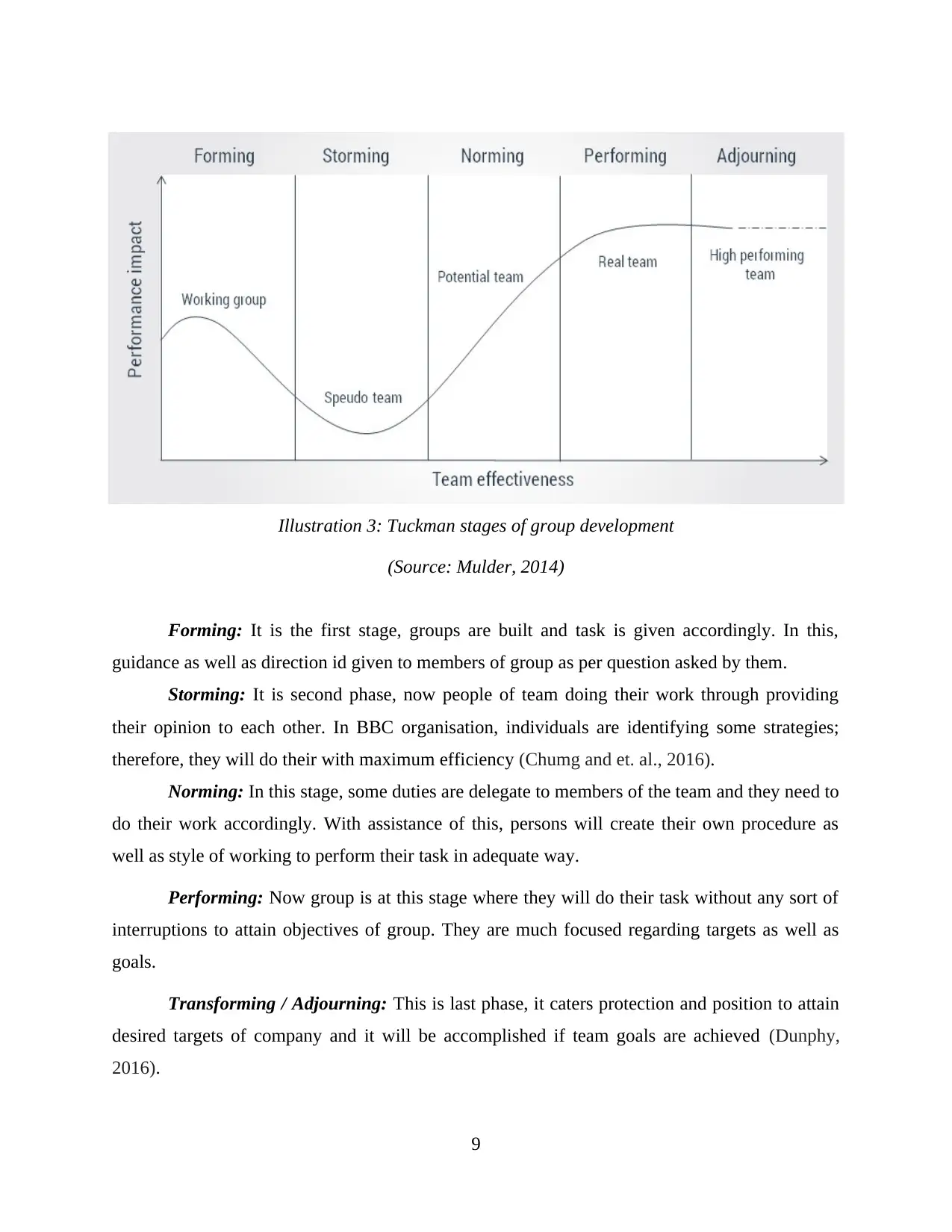
Forming: It is the first stage, groups are built and task is given accordingly. In this,
guidance as well as direction id given to members of group as per question asked by them.
Storming: It is second phase, now people of team doing their work through providing
their opinion to each other. In BBC organisation, individuals are identifying some strategies;
therefore, they will do their with maximum efficiency (Chumg and et. al., 2016).
Norming: In this stage, some duties are delegate to members of the team and they need to
do their work accordingly. With assistance of this, persons will create their own procedure as
well as style of working to perform their task in adequate way.
Performing: Now group is at this stage where they will do their task without any sort of
interruptions to attain objectives of group. They are much focused regarding targets as well as
goals.
Transforming / Adjourning: This is last phase, it caters protection and position to attain
desired targets of company and it will be accomplished if team goals are achieved (Dunphy,
2016).
9
Illustration 3: Tuckman stages of group development
(Source: Mulder, 2014)
guidance as well as direction id given to members of group as per question asked by them.
Storming: It is second phase, now people of team doing their work through providing
their opinion to each other. In BBC organisation, individuals are identifying some strategies;
therefore, they will do their with maximum efficiency (Chumg and et. al., 2016).
Norming: In this stage, some duties are delegate to members of the team and they need to
do their work accordingly. With assistance of this, persons will create their own procedure as
well as style of working to perform their task in adequate way.
Performing: Now group is at this stage where they will do their task without any sort of
interruptions to attain objectives of group. They are much focused regarding targets as well as
goals.
Transforming / Adjourning: This is last phase, it caters protection and position to attain
desired targets of company and it will be accomplished if team goals are achieved (Dunphy,
2016).
9
Illustration 3: Tuckman stages of group development
(Source: Mulder, 2014)
⊘ This is a preview!⊘
Do you want full access?
Subscribe today to unlock all pages.

Trusted by 1+ million students worldwide
1 out of 17
Related Documents
Your All-in-One AI-Powered Toolkit for Academic Success.
+13062052269
info@desklib.com
Available 24*7 on WhatsApp / Email
![[object Object]](/_next/static/media/star-bottom.7253800d.svg)
Unlock your academic potential
Copyright © 2020–2026 A2Z Services. All Rights Reserved. Developed and managed by ZUCOL.





